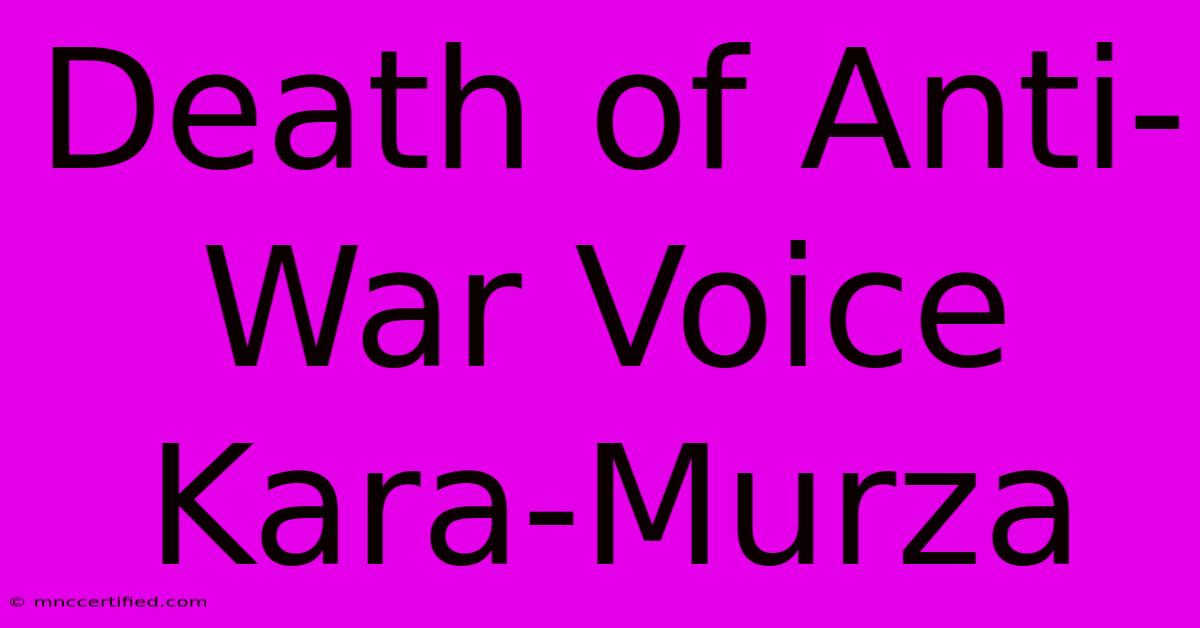Death Of Anti-War Voice Kara-Murza

Table of Contents
The Death of Kara-Murza: A Loss for Anti-War Voices in Russia
The death of Vladimir Kara-Murza, a prominent Russian anti-war activist and journalist, marks a profound loss for democracy and freedom of speech. His passing, shrouded in suspicion given his past health struggles following alleged poisonings, underscores the perilous environment for dissent within Russia. This article delves into Kara-Murza's life, his unwavering opposition to the Kremlin, and the implications of his death on the future of anti-war activism in Russia and globally.
A Life Dedicated to Opposition
Vladimir Kara-Murza Jr., born in 1981, was a staunch critic of Vladimir Putin's regime. He wasn't merely a vocal opponent; he actively worked to expose human rights abuses and the authoritarian nature of the Russian government. His commitment was unwavering, despite facing severe consequences. He was a key figure in the Open Russia movement, advocating for democratic reforms and challenging the narrative surrounding the war in Ukraine. His work encompassed investigative journalism, political activism, and public speaking, making him a significant threat to the established power structure.
Two Alleged Poisonings: A Pattern of Suppression?
Kara-Murza's death comes after two near-fatal poisonings, in 2015 and 2017, events that many believe were orchestrated by the Russian government to silence him. These incidents, far from deterring him, only strengthened his resolve. He continued to speak out, defying the immense risks he faced. The suspected poisonings highlight the lengths to which the Kremlin is willing to go to suppress dissent and eliminate voices challenging its authority. This pattern of intimidation and violence serves as a stark warning to other potential critics.
The Implications of Kara-Murza's Death
The death of Vladimir Kara-Murza has far-reaching implications. It represents a chilling blow to the already limited space for free speech and opposition within Russia. His passing sends a message of fear and intimidation, potentially discouraging others from openly criticizing the government.
Impact on Anti-War Activism in Russia
The silencing of such a prominent figure significantly impacts the anti-war movement within Russia. Kara-Murza was a key figure, providing leadership, organization, and a powerful voice against the war in Ukraine. His death leaves a void that will be difficult to fill, particularly given the increasing repression of dissent.
International Condemnation and Calls for Accountability
Kara-Murza's death has drawn international condemnation. Numerous governments, human rights organizations, and international bodies have expressed outrage and demanded a thorough investigation into the circumstances surrounding his death. The international community is calling for accountability, emphasizing the need to hold those responsible for his demise accountable for their actions. This global response underscores the significance of his work and the international concern over the erosion of human rights within Russia.
The Legacy of Resistance: Remembering Kara-Murza
While Vladimir Kara-Murza is gone, his legacy of resistance lives on. His unwavering commitment to democratic ideals and his courageous opposition to authoritarianism serves as an inspiration to activists and dissidents worldwide. His fight against injustice will continue to resonate, fueling the struggle for freedom and accountability in Russia and beyond. His story reminds us of the vital importance of defending freedom of speech and the severe consequences of silencing dissenting voices. The international community must remain vigilant in its support of those who fight for democracy and human rights in the face of oppression. The memory of Vladimir Kara-Murza must serve as a constant reminder of the price of freedom and the importance of defending it.
Keywords: Vladimir Kara-Murza, anti-war activist, Russia, Putin, human rights, freedom of speech, poisoning, death, democracy, Open Russia, Ukraine war, international condemnation, dissent, oppression, legacy.

Thank you for visiting our website wich cover about Death Of Anti-War Voice Kara-Murza. We hope the information provided has been useful to you. Feel free to contact us if you have any questions or need further assistance. See you next time and dont miss to bookmark.
Featured Posts
-
Mizzou South Carolina Football Gallery
Nov 17, 2024
-
Fox On His Kings Scoring Record
Nov 17, 2024
-
Chapter 6 Review Chemical Bonding
Nov 17, 2024
-
Pitt Football Starting Xi Vs Clemson Revealed
Nov 17, 2024
-
Ufc 309 Fight Card And Results
Nov 17, 2024